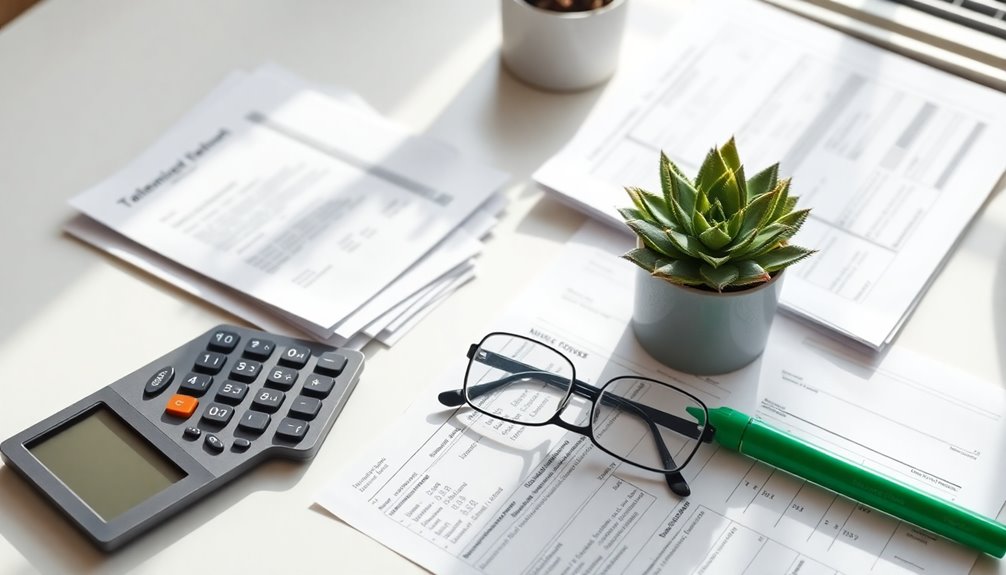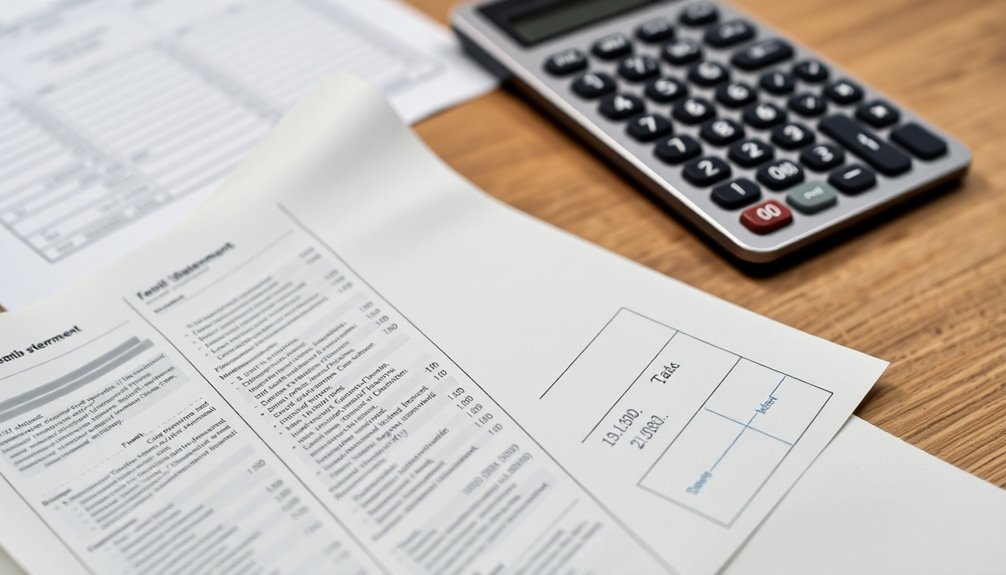Yes, you can use bank statements as receipts for taxes, particularly if traditional receipts are lost. They provide a clear record of your transactions, including dates, amounts, and payee names, which can help verify your expenses. However, be cautious as bank statements often lack detail and might not meet all IRS requirements. It's wise not to rely solely on them; keeping your records organized can prevent issues during audits. If you're curious about best practices and additional documentation you'll need, there's plenty more to uncover that will help you stay compliant and prepared.
Key Takeaways
- Bank statements can serve as alternative documentation for expenses if receipts are lost, particularly for self-employed individuals and small businesses.
- They provide a record of transactions, including payee name, date, and amount, but may lack detailed descriptions needed for IRS compliance.
- Relying solely on bank statements may lead to denied deductions during audits, as they often mix personal and business transactions.
- It is best to maintain itemized records and receipts alongside bank statements to substantiate expenses claimed on tax returns.
- Consult tax professionals for personalized advice on using bank statements and ensuring compliance with IRS guidelines.
Definition of Bank Statements

Bank statements, typically issued monthly or quarterly, provide a comprehensive overview of your account activity during a specific period. You can receive these statements in either paper or digital form, and while banks aren't required to send a monthly statement unless there's at least one electronic fund transfer, you'll likely find them useful for tracking your finances.
Each statement includes the bank's contact information, your account number, and the statement date, along with the total number of days in the statement period. You'll see a detailed list of transactions, including deposits, withdrawals, transfers, and any fees incurred, all arranged in chronological order.
The beginning and ending balances of your account will also be listed, giving you a clear picture of your financial standing. Regularly reviewing bank statements is important as it aids in tracking expenses and identifying discrepancies in your account.
Using bank statements is crucial for tracking spending and verifying account activity. They help you detect unauthorized transactions and serve as an essential tool for financial management.
When They Are Acceptable

When it comes to tax documentation, bank statements can be a useful alternative to traditional receipts in several scenarios. If you've lost a receipt, your bank statement can act as a backup, helping you recreate the necessary paper trail for the IRS. This is especially beneficial for self-employed individuals and small business owners, as it verifies financial transactions reported on your tax return.
Bank statements are also handy for documenting routine or minor expenses, like office supplies or meals, where detailed receipts may not be available. They clearly show the date, amount, and nature of the expense, which can support your deductions. Additionally, it's important to remember that receipts should be retained for three years post-filing to minimize audit stress.
For larger transactions, bank statements provide a straightforward record, making it easier to verify significant expenditures without keeping cumbersome receipts. As long as the statements include the payee's name, date, and amount, they serve as reliable proof for deductions claimed on your tax return.
Finally, ensure your bank statements are legible and easily accessible if an auditor requires them. Digital copies are acceptable if stored properly, so keep your records accurate and organized for easy retrieval.
Limitations of Bank Statements

While bank statements can be useful for tracking expenses, they come with significant limitations that you should be aware of. One major issue is the lack of detail; bank statements often provide vague descriptions of transactions. The IRS demands specific information about the nature of each expense, and without this, your statements may not meet their requirements. Simply seeing "Costco" or "Best Buy" isn't enough without context linking it to a business purpose.
Another limitation is the risk of mixing personal and unauthorized transactions. The IRS won't accept deductions for personal expenses, so you need to ensure your bank statements only reflect business-related activities. Mixing these can complicate audits and jeopardize your deductions.
Additionally, bank statements usually don't match specific line items on your tax returns. This means you might need to provide extra documentation, like invoices or receipts, to support your claims. Relying solely on bank statements can lead to denied deductions during audits since auditors often require more detailed records to verify expenses. Therefore, maintaining accurate, itemized records is essential for a smooth tax process, as proper record-keeping ensures compliance and reduces the risk of errors.
Types of Acceptable Records

Keeping track of your financial records is crucial for a smooth tax season. To ensure you're prepared, it's essential to know the types of acceptable records you can use as receipts. Traditional receipts include canceled checks, invoices, credit card receipts, sales slips, and petty cash slips. These documents provide clear evidence of your transactions.
Bank and financial statements can also serve as valid records. Bank statements will help if they detail the date, amount, and purpose of each transaction. You can include credit card statements and account statements that itemize transactions. Check registers and investment statements, like 1099-INT or 1099-DIV, are equally important. Additionally, having the necessary income statements from employers and other income sources can further substantiate your claims.
Specific tax forms and documents must be included as well. These include various 1099 forms, Form W-2, and Form 1098 for mortgage interest. Don't forget about Form 1095-A for health insurance through a State Marketplace.
Lastly, gather other supporting documents like vouchers, sales contracts, records of charitable donations, and travel logs. By organizing these records, you'll simplify your tax preparation and ensure you have everything you need when filing.
Record-Keeping Best Practices

Effective record-keeping is essential for a hassle-free tax season, ensuring you can easily access and present your financial information. Start by organizing your receipts into categories like utilities, travel, and business expenses, creating subcategories for better clarity. Keep your receipts in chronological order to simplify retrieval when needed.
You can store both hard copies and electronic records, but make sure they're accessible to the IRS at all times. Scanning receipts and saving them in digital folders can save space and enhance accessibility. Use tools to track expenses and generate necessary records automatically, and regularly reconcile these with your bank statements. Remember that IRS guidelines recommend maintaining your records for at least three years from the due date of your return, or longer if required. Keep notes on receipts to clarify the deductible nature of expenses, and always ensure your records are in a machine-sensible and auditable form.
Lastly, consult IRS guidelines and tax professionals for personalized advice, and regularly review your records to ensure compliance and accuracy. Following these best practices will help you stay organized and prepared when tax season arrives.
Consequences of Missing Receipts

Missing receipts can lead to significant financial repercussions during tax season. Without proper documentation, the IRS might disallow certain deductions, which can increase your tax liability. This means you could end up owing more money than expected. Deductions need to be substantiated, and a lack of proof raises questions about their legitimacy.
Additionally, if there are major discrepancies between your reported figures and actual income or deductions, you could face audit penalties. The IRS might impose penalties if it determines there's intentional or negligent underreporting, which can add to your financial burden. This is particularly important during a line-by-line audit, where each deduction is scrutinized.
Moreover, unsubstantiated expenses can lead to additional taxes based on the IRS's findings. This translates to a higher taxable income, impacting your cash flow and overall financial health.
Finally, missing receipts can raise red flags, potentially triggering tax investigations. Frequent or significant omissions may suggest tax evasion or fraud, resulting in hefty fines, penalties, or even legal action.
Keeping thorough records is crucial to avoid these severe consequences and maintain your financial stability during tax season.
Working With Tax Professionals

Navigating tax season can be overwhelming, but working with tax professionals can make the process smoother and more efficient. They play a crucial role in collecting and organizing your financial information. By gathering all relevant documents, including receipts and bank statements, they ensure everything is accurate before completing your tax return.
They'll organize your receipts by category, making it easier to access them during audits and ensuring all deductions and credits are applied correctly. Tax professionals also provide invaluable tax planning advice. They recommend tax-efficient investment strategies and discuss how major financial decisions might impact your taxes. Staying updated with current tax laws, they help you understand what records you need to maintain for compliance. Moreover, they possess in-depth knowledge of federal, state, and local tax laws, which allows them to provide tailored guidance specific to your situation.
Additionally, they handle communication with tax agencies, resolving disputes and negotiating settlements when necessary. Should an audit arise, they represent you, ensuring that all interactions with the IRS are documented.
Finally, they'll ensure your bank statements meet IRS criteria and advise on record-keeping practices, including using digital forms of proof. By partnering with tax professionals, you can maximize your tax situation while ensuring compliance with IRS requirements.
Frequently Asked Questions
Are Bank Statements Valid for Personal Expenses During Tax Filing?
When dealing with personal expenses during tax filing, bank statements can be useful, but they've limitations. They show transaction amounts and dates, which helps, but they often lack details about the nature of purchases.
If you're missing receipts, bank statements can back you up, especially for routine expenses. However, for clarity and to meet IRS requirements, you might still need additional documentation to support your claims.
How Long Should I Keep Bank Statements for Tax Purposes?
You should keep bank statements for at least 3 to 7 years for tax purposes.
The IRS typically has 3 years to audit your returns, but holding onto 6 to 7 years of statements is safer.
If you're claiming deductions for worthless securities or bad debts, keep those statements for 7 years.
For employment tax records, maintaining them for 4 years is necessary.
Digital storage makes it easier to organize and access your statements.
Can I Use Bank Statements for Business Travel Expenses?
Yes, you can use bank statements for business travel expenses, but they need to be detailed.
Make sure your statements show the date, amount, and nature of the expense clearly.
It's best to couple them with other documentation, like receipts or notes about the business purpose.
This combination strengthens your case and helps you avoid issues with substantiation when tax time comes around.
Keep everything organized for easy reference!
What if My Bank Statement Is Missing Transaction Details?
If your bank statement is missing transaction details, don't panic.
Start by reviewing your account history and categorizing transactions correctly. Check for any filters that might be hiding entries in your bank register. You might find missing transactions in the Uncategorized Income or Expense sections.
Reconciling your bank account with the statement can also help ensure you account for all transactions. Staying organized will make tracking expenses much easier.
Do I Need to Provide Bank Statements for All Deductions?
You don't need to provide bank statements for all deductions.
While they can support some transactions, specific expenses like meals, travel, and charitable donations require detailed receipts. If a bank statement lacks sufficient information, it won't meet IRS requirements.
Instead, focus on gathering proper documentation for significant deductions. Keeping organized records and consulting a tax professional can help you ensure you're covered for any claims you make on your tax return.
Conclusion
In conclusion, while bank statements can sometimes serve as proof of expenses for tax purposes, they aren't a complete substitute for receipts. It's crucial to keep accurate records and understand the limitations of using bank statements alone. By following best practices and consulting with tax professionals, you can ensure you're prepared for tax season. Don't risk penalties due to missing receipts—stay organized and proactive to make tax time easier for yourself.









